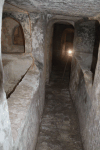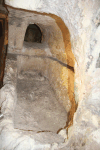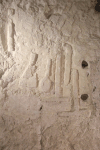
In the catacombs. In some areas it was a veritable maze. (840k)
In Mdina I visited the St. Paul's Catacombs, a large underground burial complex. It was fascinating to walk through several of the catacombs.
The Catacombs on Malta are splendid examples of the many sites of Ancient Civilizations that I visited during my travels.
All pictures are © Dr. Günther Eichhorn, unless otherwise noted.
From the Wikipedia entry for St. Paul's Catacombs
St. Paul's Catacombs are some of the most prominent features of Malta's early Christianity archaeology. The archaeological clearing of the site has revealed an extensive system of underground galleries and tombs dating from the fourth to the ninth centuries CE.
St. Paul's catacombs are part of a large cemetery once located outside the walls of the ancient Greek city of Melite, now covered by the smaller Mdina and Rabat. It also comprises the catacombs of Saint Agatha, San Katald, St. Augustine and many others.
The cemetery probably originated in the Phoenician-Punic period. As in Roman tradition, Phoenician and Punic burials were located outside city walls. The many tombs discovered in areas outside the known line of the Roman city suggest that the city of Melite was close to equal size.
The early tombs consisted of a deep rectangular shaft with one or two chambers dug from its sides. This type of burial was used well into the Roman occupation of the islands, but the chambers grew larger and more regular in shape over time. It is probable that this enlargement joined neighboring tombs and led to the creation of small catacombs, which became the norm by the fourth century CE.
The entrance to the main complex of St Paul's Catacombs leads to two considerably large halls, adorned with pillars made to resemble Doric columns and painted plasters most of which have now disappeared. On keeping with what seems to have been a norm in most Christian catacombs, these main halls are equipped with two circular tables set in a low platform with sloping sides which resemble the reclining couch (triclinium) present in Roman houses. In all cases found in the main complex and the numerous other Christian Hypogea of the site, both table and couch are hewn out in one piece form the living rock forming a single architectural unit within an apsed recess. Although various interpretations may be found, these triclinia, or Agape tables, were probably used to host commemorative meals during the annual festival of the dead, during which the rites of burials were renewed.























This page contains 23 pictures
Page last updated on Tue Sep 24 18:19:03 2019 (Mountain Standard Time)
Malta - Catacombs on gei.aerobaticsweb.org